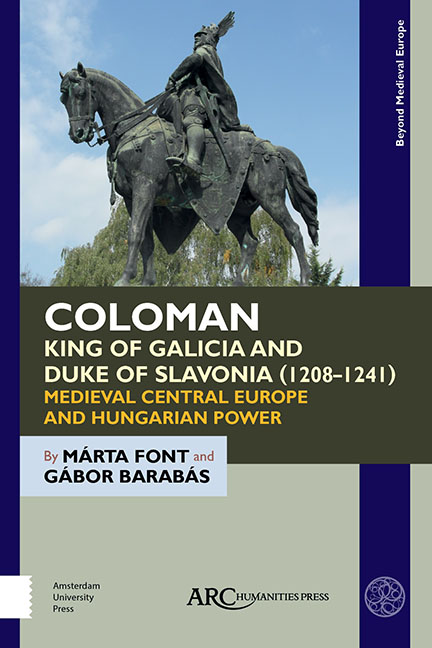 Coloman, King of Galicia and Duke of Slavonia (1208–1241)
Coloman, King of Galicia and Duke of Slavonia (1208–1241) Book contents
- Frontmatter
- Contents
- List of Illustrations
- Foreword
- Introduction
- PART ONE COLOMAN AS CHILD RULER OF GALICIA
- Chapter 1 The Galician Context in 1205
- Chapter 2 The Agreement of Scepus
- Chapter 3 Coloman’s Coronation as King of Galicia: Date and Place
- Chapter 4 The Hungarian Elite and Coloman’s Court
- Chapter 5 Coloman’s Position in Halych, 1215–22: Campaigns and Opponents
- Chapter 6 Upholding the Galician Claim: Coloman’s Place in Hungary
- PART TWO COLOMAN, DUKE OF WHOLE SLAVONIA (1226–1241)
- Chapter 7 Coloman and Scepus, Before 1226
- Chapter 8 Coloman as Duke of Whole Slavonia from 1226
- Chapter 9 Coloman’s Status and the Inner Workings of the Duchy
- Chapter 10 Coloman’s Ecclesiastical and Secular Actitivities in Slavonia
- Chapter 11 Coloman’s Rule in Slavonia
- Chapter 12 Politics and Dynastic Affairs
- Chapter 13 Challenges in the Balkans
- Chapter 14 The Mongol Attack and Coloman’s Death
- Conclusion: Coloman in the Eyes of Posterity
- Bibliography
- Index
Chapter 10 - Coloman’s Ecclesiastical and Secular Actitivities in Slavonia
Published online by Cambridge University Press: 20 November 2020
- Frontmatter
- Contents
- List of Illustrations
- Foreword
- Introduction
- PART ONE COLOMAN AS CHILD RULER OF GALICIA
- Chapter 1 The Galician Context in 1205
- Chapter 2 The Agreement of Scepus
- Chapter 3 Coloman’s Coronation as King of Galicia: Date and Place
- Chapter 4 The Hungarian Elite and Coloman’s Court
- Chapter 5 Coloman’s Position in Halych, 1215–22: Campaigns and Opponents
- Chapter 6 Upholding the Galician Claim: Coloman’s Place in Hungary
- PART TWO COLOMAN, DUKE OF WHOLE SLAVONIA (1226–1241)
- Chapter 7 Coloman and Scepus, Before 1226
- Chapter 8 Coloman as Duke of Whole Slavonia from 1226
- Chapter 9 Coloman’s Status and the Inner Workings of the Duchy
- Chapter 10 Coloman’s Ecclesiastical and Secular Actitivities in Slavonia
- Chapter 11 Coloman’s Rule in Slavonia
- Chapter 12 Politics and Dynastic Affairs
- Chapter 13 Challenges in the Balkans
- Chapter 14 The Mongol Attack and Coloman’s Death
- Conclusion: Coloman in the Eyes of Posterity
- Bibliography
- Index
Summary
WE KNOW ABOUT several interactions with ecclesiastical and secular lords which cast light on Coloman's rule. In turn we will discuss his conflict with the Knights Templar, his relationship with Bishop Stephen of Zagreb, major constructions of castles and religious buildings, and then the ambitious union of the bishopric of Zagreb with the archdiocese of Split.
Litigation with the Knights Templar of Slavonia
The Templars of Slavonia approached the court of the Apostolic See to litigate against Coloman. The papal procedure was initiated due to a complaint from the order who claimed that the duke had taken hold of certain possessions and had restricted their privileges. The Templars instigated proceedings in July 1231, and in a letter to the duke the pope admonished Coloman to respect the order's privileges and to restore their estates.
This letter was, however, not the first step in the procedure. The duke's actions had already led to papal authorization of the bishops of Pécs and Zagreb, and the archbishop of Kalocsa who were delegated to engage in ecclesiastical censure of Coloman and his advisers, if necessary. It is remarkable that the Templars would work with the bishop of Zagreb, with whom they had previously been in litigation over a particular estate; the procedure started at the Slavonian duke's court, whereas later the agreement was made with the help of Archbishop Ugrin of Kalocsa. The pope had to authorize new delegates because of the duke's refusal to cooperate, so the bishop and the provost of Pécs, and the Benedictine abbot of Pécsvárad were mandated instead in July 1231. They were, however, not empowered to excommunicate Coloman, even though the duke finally accepted the terms of Gregory IX and granted immunity to the Slavonian, Croatian, and Dalmatian provinces of the Templars and freed their estates from all taxes (marturina, collecta, pondus, and so forth) and from tolls. Nevertheless, a later papal letter makes it clear that the duke did not comply with his own promises. Gregory IX admonished Coloman's actions again in January 1236, as he took hold of several estates from the order.
- Type
- Chapter
- Information
- Coloman, King of Galicia and Duke of Slavonia (1208–1241)Medieval Central Europe and Hungarian Power, pp. 91 - 98Publisher: Amsterdam University PressPrint publication year: 2019


